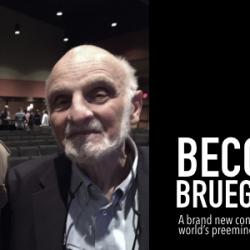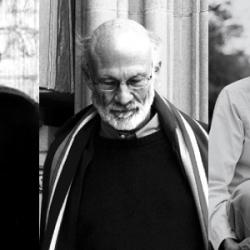 My series, Tuesdays with Walter, continues today with a reflection on one simple but revolutionary concept from Chapter 02 of The Prophetic Imagination. If you want to catch up here is part 01, part 02, and part 03. The point of this series is to do a close reading of WB’s great book with an eye toward what it teaches us about leadership. Is there such a thing as prophetic leadership?
My series, Tuesdays with Walter, continues today with a reflection on one simple but revolutionary concept from Chapter 02 of The Prophetic Imagination. If you want to catch up here is part 01, part 02, and part 03. The point of this series is to do a close reading of WB’s great book with an eye toward what it teaches us about leadership. Is there such a thing as prophetic leadership?
Last week, I noted that Brueggemann teaches that God is Free. This means that God cannot be co-opted by any church, religion, or especially any government. The Story of King Solomon is a story about how the culture that Solomon was building attempted to co-opt the God of Israel for the Royal projects. God does not belong to us. The moment you co-opt the God who is free, this God organizes against you.
I want to tease this out a little bit, because I think it is key for leadership. King Solomon’s reign represented a fundamental shift from the Davidic kingship. The reign of Solomon can be seen as a rejection of the Mosaic imagination and a total change in values toward: affluence, oppressive social policy, and the static religion which closed the door on the freedom of God and allowed the king a monopoly on power. They also would provide an environment of satiation which the empire can achieve. Moses was a radical and his vision was radical. Solomon was an imperialist along the same lines as Pharaoh, who was finally concerned with the self-preservation of the kingdom.
This has much to say about the idea of America as a Christian nation. When people ask me if I think America was founded as a Christian nation, I often will say “I hope not. Because we were conceived in genocide of a native people, and then prospered for 200 years on the backs of African slaves.” If we are a Christian nation, what does this say about Christ? What does this say about our commitment to Christ? Brueggemann envisions a church that remains free from entanglement with any government precisely so that those who are oppressed (the Native American, the slave), can appeal to God for vindication when the government oppresses them. Brueggemann says that the God who was co-opted by Solomon is unavailable to those whom Solomon oppressed! “This God is no court of appeal for the marginal ones over against the king, for he is now completely beholden to the king,” (30).
The prophetic faith begins its critique by pronouncing that God is free! God is not an American! God is not a Baptist or a Presbyterian or whatever your group is. God is not the substantiating narrative behind our project… God has God’s own project! This is a radical undercutting of nearly all of what passes for Christian leadership. God is not available for us to co-opt in order to ensure the success of our leadership venture, especially when it involves a church. The Christian faith can never become co-opted by a government in order to provide that government with the legitimizing rationale for its form or substance. If God is free, then the church must be free as well.
The Royal Consciousness will try to silence the prophetic voice. If you make the king aware of his/her over stepping, they will come after you with pitch forks. WB says this will usually happen in one of two ways. First, heavy handed prohibition – the direct attack and silencing of the prophet. Second, develop a natural immunity so that the empire becomes impervious to criticism. In our world, the first is not usually a possibility. The second is constant!
Leadership Reflections
I think Brueggemann’s vision for leadership completely subverts the current church leadership conversation. What’s interesting is that I think WB subverts not only the church growth leadership model, but it subverts the Missional Leadership conversation as well. The reason is that missional leadership is still completely saturated with pragmatics! It has not learned to resist the temptation to co-opted God in order to have God bless it’s model. In other words, the house church network model has simply replaced the church growth model in the seat of power.
Here are three things I see in WB that church leaders need to hear:
1) God cannot become the legitimizing narrative co-opted to give the Christian leader rational for all of our projects. We join with God, God does not join with us. We will have God’s blessing when we join in God’s mission to be sure. But we will have God’s opposition when we continue to try and build our Towers of Babel (even if they are not top down towers). One of the key ways we know whether or not this is happening in our churches is this: when the “minority report” comes to those in power. When those the minority opinion is squelched or suppressed and does not find its way to the seat of power within a church or organization, the leadership has co-opted God and is part of the Royal Consciousness (I’m looking at you, megachurch pastors).
2) The mission of God is not a program, it is a passion. This passion, this mission manifests in a covenant relationship with God in which the life of the believer is continually poured out for the life of the community in the firm faith/conviction that life will never run out. Prophetic leadership is not trained in on accomplishing goals and meeting metrics – that’s the job of the Royal Consciousness. Prophetic leadership is “devoted to the pathos and passion of covenanting,” (37). The focus is on redemptive relationships. The way we say this at Redemption Church is, “Your mission is always the person sitting next to you.”
3) The constant covenanting required for membership in the community of the faithful is subverted by the leader who promises satiation (customer satisfaction), instead of sacrifice. Christian leadership cannot promise that your needs will be met. Christian leadership can only promise that as you exhaust your life on behalf of the “other,” God will never let you run out of life. Even if you literally die, you’ll be awakened on the other side and God will dust you off and breathe life back into your bones.












